Fayette County, Texas Biographies
The following articles and photographs were taken from F. Lotto's Fayette County, Her History and Her People, published in 1902.
Leading Citizens of Fayette County.
Schulenburg is proud to number among her many 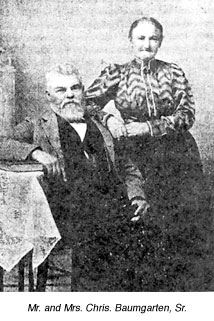 useful citizens a man who, by his inventive genius, has lastingly benefitted a whole industry and placed it on a paying basis: Mr. Chris Baumgarten. The industry benefitted by his inventions in the cotton seed oil industry. Mr. Chris Baumgarten has invented and taken out patents for the following inventions: Hydraulic Cotton Baling Press, Plate System for Hydraulic Oil Presses, and Linting Process of the Delinter for removing the last remnants of cotton from the seed after passing through a linter. All these inventions are now in general use in all first class oil mills throughout the United States. There is no man living who knows more about the process of manufacturing cotton seed into oil, meal, hulls, etc., than Mr. Baumgarten. He is the proprietor of the Schulenburg Oil Mill. This mill is a model oil mill. As soon as a new invention is made in the processes for crushing cotton seed- and proves to be good-it is adopted. He has constantly and unceasingly labored to make his oil mill a model establishment and he has succeeded in this better than any man in the United States. Like all men of inventive genius, his is modest and unassuming and a stranger would hardly know that he is the man who caused a revolution in the manufacture of cotton seed oil. Though he pays his greatest attention to the oil business, he does by no means stop there; he is forward to promoting all enterprises that tend to develop the industries of this county.
useful citizens a man who, by his inventive genius, has lastingly benefitted a whole industry and placed it on a paying basis: Mr. Chris Baumgarten. The industry benefitted by his inventions in the cotton seed oil industry. Mr. Chris Baumgarten has invented and taken out patents for the following inventions: Hydraulic Cotton Baling Press, Plate System for Hydraulic Oil Presses, and Linting Process of the Delinter for removing the last remnants of cotton from the seed after passing through a linter. All these inventions are now in general use in all first class oil mills throughout the United States. There is no man living who knows more about the process of manufacturing cotton seed into oil, meal, hulls, etc., than Mr. Baumgarten. He is the proprietor of the Schulenburg Oil Mill. This mill is a model oil mill. As soon as a new invention is made in the processes for crushing cotton seed- and proves to be good-it is adopted. He has constantly and unceasingly labored to make his oil mill a model establishment and he has succeeded in this better than any man in the United States. Like all men of inventive genius, his is modest and unassuming and a stranger would hardly know that he is the man who caused a revolution in the manufacture of cotton seed oil. Though he pays his greatest attention to the oil business, he does by no means stop there; he is forward to promoting all enterprises that tend to develop the industries of this county.
The parents of Chris Baumgarten were Christian and Maria (Burgemeister) Baumgarten. Their son, Chris Baumgarten was born March 13, 1836, at Tartun, Province Saxony, Prussia. He went to the public schools of his birthplace and after completing his education there, he learned the trade of carpenter. He came to Texas in 1854 and first landed at Galveston. There he worked for seven months at his trade. He next worked in a great many parts of the state. In 1856 he came to Fayette County and first stayed at Ross Prairie. He then went to La Grange where he married Miss Ernestine Pannewitz of that city (1859). The same year he moved to High Hill. Here he had bought a place where now the western half of Schulenburg stands. He followed the occupations of farming and carpentering. In 1867 he built a small oil mill for F. Hillje in High Hill. In 1882 he built the Schulenburg Oil Mill. In 1890 he organized companies in the state and built eight oil mills in all of which he retained stock. He also remodeled his Schulenburg Oil Mill which has become a model oil mill in the United States.
His children are: Mary, deceased; Ernest in the lumber business in Schulenburg; Alma, deceased; Gus A., manager of the Schulenburg Oil Mill; Emil, dealer in furniture, hardware, wagons, buggies, and lumber at Schulenburg; Annie, wife of Max Wolters, merchant at Shiner; Lillie, deceased; Elizabeth, wife of Gus Ruhmann, dealer in hardware and furniture in Shiner; Christian, bookkeeper for E. Baumgarten & Bro. At Schulenburg; Charles, assistant in oil mill of Schulenburg; Heinrich, deceased; William and Fritz, at home. — pp.236 - 238
Gus Baumgarten, son of Mr. Chris Baumgarten, Sr., 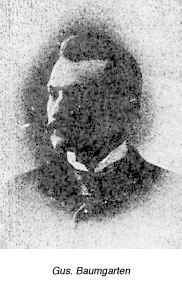 is like his father, an authority on all questions in regard to the cottonseed oil industry. His through knowledge of this subject, his ability and energy are recognized throughout the whole South. For a number of years, the Oil Mill Superintendent’s Association of Texas elected him for their secretary and treasurer, knowing that they could not find an abler man who was better qualified and more willing to faithfully work in their interest than him. This position he resigned on account of his many arduous duties in the oil business, but that association honored him for his eminent services in the behalf during his term as secretary by electing him as vice president in 1901. Mr. Baumgarten is the leading spirit of that association and of the whole oil industry in Texas. His opinions and recommendations are highly regarded throughout the state. Men in the oil business, in looking for managers of their mills, very often ask him to recommend them competent men for the position. A great many young men whom he had instructed in the oil business in the oil mill at Schulenburg he recommended, and they are now earning salaries of $1800 to $5000 per year. As is the case with all men who do not divide their energies, but direct them all to one single point, Mr. Baumgarten is a master in his line of the business. For the last twenty years he has been the superintendent and manager of his father’s oil mill at Schulenburg.
is like his father, an authority on all questions in regard to the cottonseed oil industry. His through knowledge of this subject, his ability and energy are recognized throughout the whole South. For a number of years, the Oil Mill Superintendent’s Association of Texas elected him for their secretary and treasurer, knowing that they could not find an abler man who was better qualified and more willing to faithfully work in their interest than him. This position he resigned on account of his many arduous duties in the oil business, but that association honored him for his eminent services in the behalf during his term as secretary by electing him as vice president in 1901. Mr. Baumgarten is the leading spirit of that association and of the whole oil industry in Texas. His opinions and recommendations are highly regarded throughout the state. Men in the oil business, in looking for managers of their mills, very often ask him to recommend them competent men for the position. A great many young men whom he had instructed in the oil business in the oil mill at Schulenburg he recommended, and they are now earning salaries of $1800 to $5000 per year. As is the case with all men who do not divide their energies, but direct them all to one single point, Mr. Baumgarten is a master in his line of the business. For the last twenty years he has been the superintendent and manager of his father’s oil mill at Schulenburg.
Gus. Baumgarten was born February 14, 1866 at his father’s house which stood then in the prairie, but now belongs to the western part of Schulenburg. He was instructed in the public schools of that place. After completing his common school education, he attended for two sessions the Gem City Business College of Quincy, IL. (1833-1890). He became a graduate of that institution. In 1890 he returned to Texas and built, in company with his father, eight oil mills in the state. He was the moving spirit of the Oil Mill Superintendents’ Association of Texas, was elected their secretary and treasurer, and in 1901 vice president of that association.
Mr. G. A. Baumgarten was married on June 22, 1892 to Ida Wallace, daughter of Frank Wallace, a conductor on the Southern Pacific Railroad. Their union was blessed by two children, Wallace and Roy. — pp.238 - 239
Schulenburg’s reputation for the splendor of its festivitie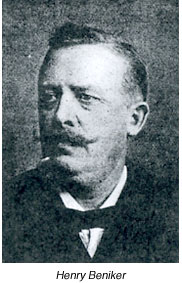 s is largely due to the unceasing efforts of Henry Beniker. The population of this city is largely German. They are of the opinion that each citizen should enjoy his personal rights to the greatest extent consistent with good order. They are the most outspoken opponents of prohibition and all sumptuary laws. The festivities of Schulenburg have the reputation of being conducted with the greatest freedom combines with the most congenial and orderly behavior. The leading spirit of these festivities is the subject of this sketch, Henry Beniker. His jolliness and congeniality are as if especially made for such festive occasions. To sustain the reputation of Schulenburg as the jolliest old town in Texas, He spares neither time nor money. He believes in the doctrine, enjoy life while it lasts, or, as the poet says “Let us have wine, women, laughter; Sermons and soda water the day after.”
s is largely due to the unceasing efforts of Henry Beniker. The population of this city is largely German. They are of the opinion that each citizen should enjoy his personal rights to the greatest extent consistent with good order. They are the most outspoken opponents of prohibition and all sumptuary laws. The festivities of Schulenburg have the reputation of being conducted with the greatest freedom combines with the most congenial and orderly behavior. The leading spirit of these festivities is the subject of this sketch, Henry Beniker. His jolliness and congeniality are as if especially made for such festive occasions. To sustain the reputation of Schulenburg as the jolliest old town in Texas, He spares neither time nor money. He believes in the doctrine, enjoy life while it lasts, or, as the poet says “Let us have wine, women, laughter; Sermons and soda water the day after.”
The parents of Henry Beniker are Henry and Helene (Juergens) Beniker, living at Nordenhaus, Oldenburg. His father was a seaman.
Henry was born at Grossensiel, Oldenburg on April 22, 1858. He went to school at Abbehausen and after completing his education, he learned the joiner’s trade in Bremerhaven. To become proficient in his trade, he traveled as is the custom in Germany, throughout that country, working in his trade under different masters. He established himself as master in his trade at Abbehausen, and on November 2, 1883, he married Miss Sophie Summer. He came to the United States in the fall of 1888 and landed at Galveston. From there he went to Sweet Home and worked there as a carpenter. In 1889 he established himself in his business. In 1893 he moved to Schulenburg and remained there in the same business. He had very often as many as twenty carpenters under him, a work that required great skill in management. In 1899 he went with John Oltmanns in the saloon business, in which he remained until his partner’s death. He is also the popular agent of the New Orleans Brewing Association, whose interests he serves with ability and success.
To his union with his wife, the following children were born: John, Henry, Willie, Herbert, Mary and Erna. They all stay at the home of their father. — pp. 239-241
Of A.W. Beniker the same may be said as of his brother. 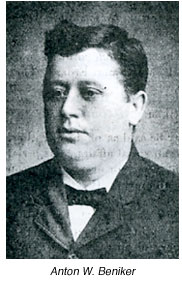 He takes great interest in feasts and all social affairs. His jovial face, his timely jokes, his pleasant words for everybody, soon find him on the feast ground, you may just go to where the largest crowd is, not that he follows the largest crowd, but wherever he goes, on account of his jollity, he soon gathers a crowd around him. Like his brother, he spares neither time, money, nor efforts to make the feasts of Schulenburg a success. His presence and his aid at these feasts have become a necessity for their success. He also takes a leading interest in all theatrical performances arranged by the citizens of Schulenburg.
He takes great interest in feasts and all social affairs. His jovial face, his timely jokes, his pleasant words for everybody, soon find him on the feast ground, you may just go to where the largest crowd is, not that he follows the largest crowd, but wherever he goes, on account of his jollity, he soon gathers a crowd around him. Like his brother, he spares neither time, money, nor efforts to make the feasts of Schulenburg a success. His presence and his aid at these feasts have become a necessity for their success. He also takes a leading interest in all theatrical performances arranged by the citizens of Schulenburg.
Anton Wilhelm Beniker was born August 26, 1866, at Grossensiel, Oldenburg. His father, Henry Beniker, was a seaman and perished in a storm at sea., when Anton was only two years old. His mother is still living at Bremerhaven. He went to school at Atens, and after his school years learned the trades of saddler and paper hanger. He traveled extensively in Germany to complete his trade education. In 1886 he entered the German Army and absolved his three years military service, as is the law in that country. He entered the nineteenth regiment of dragoons which is stationed at Osternburg, Oldenburg. Though he was a splendid soldier, and well liked by this officers on account of his efficiency and ability, his convictions were against this form of government that required the best years of a man’s life in order to train him to fight for and support a monarchical and oppressive form of government. He therefore left the fatherland for the United States as a country more in harmony with his political convictions. He first came to Sweet Home and followed the occupation of painting. From there he went to Shiner and in 1894 he came to Schulenburg. Here he was a leading painter, being quite successful in this business. In December 1901 he established, in company with his brother Henry, a saloon at the old John Oltmanns stand. The strict attention of the brothers to business, their jolliness and congeniality, have made their business place the most popular establishment in Schulenburg.
Dextera praecipue capit indulgentia mentes;
Asperitas odium saevaque bella movet.
—OVID
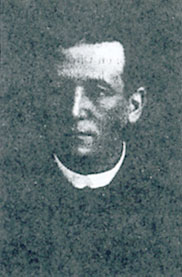
Rev. J. Chromcik |
Rev. J. Chromcik was born January 25, 1845, at Olmuetz, Moravia, Austria. He finished his course of studies in Olmuetz and graduated there in 1866. After ordination he was assistant priest at Lichtenau, Moravia. He then became administrator of the parish of Senftleben, Moravia. Having been assigned to the diocese of Galveston by Bishop Dubuois, he went to Texas and arrived there on Christmas eve, 1872. He was sent to Fayetteville where he has resided ever since. In 1894 he made a trip to Europe to celebrate the jubilee of the twenty-fifth anniversary of his ordination. On his return he brought with him four worthy young clergymen: Rev. Skocek, Rev. Sebik, Rev. Mahan and Rev. Kacer. — pp. 242-244
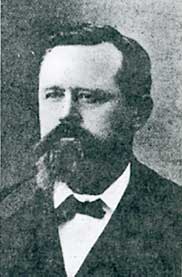
Dr. I. E. Clark |
Dr. Clark is one of the finest surgeons in the state. He was the first one in Fayette County that operated for gunshot wounds of the intestines where several holes had been made in the intestines; the patient recovered. He removed an ovarian tumor weighing sixty-six pounds from an old lady sixty-three years of age; she was well in three weeks. He has performed successfully many dangerous operations, a great many of them for appendicitis. He is the local surgeon for the Southern Pacific Railway Company.
The parents of Dr. I. E. Clark are Dr. H. S. Clark and Mrs. Cilo A. (Robertson) Clark. They came from Tennessee to Texas in 1854 and first settled in Polk County. In 1861 they moved to Gonzales County and in 1865 to [Mixon] Creek near Kinkler, Lavaca County, where his father still resides, a practising physician of Lavaca County. His mother died there in 1877.
Dr. I. E. Clark w as born December 3, 1860, in Polk County, Texas. He first attended the public schools of Lavaca County and later from 1875 to 1879 Judge Byars' High School of Covingt on, Tennessee, where lie also studied Latin, Greek and French. He received a certificate of thoroughness from that institution. In 1879 he read medicine for four months under his father and from 1879 to 18S2 he studied his profession at the Jefferson College of Philadelphia. After graduation he completed the practical side of his professional studies as resident physician in the Pennsylvania Hospital of Philadelphia. In 1890 he visited a great many medical schools in the United States and wound up by a one year's course in the Polyclinic of New York. There are few physicians in the state who have prepared themselves with so much thoroughness for the practice of their profession as Dr. Clark. He started the practice of his profession at Moravia, Lavaca County, in 1883. and in 1887 he moved to Schulenburg where he has been a resident physician ever since.
In 1888 he married Miss Ella Wolters. daughter of K. Wolters, sr., one of the most prominent business men of Schulenburg. Their children are Clio A. Clark, born 1889, and Harvey R. Clark born in I891.
Lately Dr. I. E. Clark has taken great interest in Beaumont oil. He has been elected president and manager of the Borealis Oil Company, the business affairs of which company he manages with great ability and success. — pp. 244–246
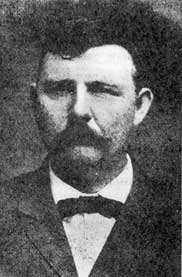
Henry Eilers |
The parents of Henry Eilers were Hinrich and Auguste (Frels) Eilers. They were natives of the grand duchy of Oldenburg. His father came to this country in 1846. The latter married Miss Augusta Frels at to Ross Prairie where he was settlers of that section. He was largely interested in drawing German and Bohemian immigrants to this fertile county. He brought the first Bohemian immigrants into this county and more immigrants to this section than any other two men. He died respected by his fellow citizens at a ripe old age in 1899. His wife had preceded him in death in 1895. He left the following children: (I) Gerhard, merchant in Yoakum; (2) Henry, the subject of our sketch; (3) William, teacher at Fayetteville; (4) August, farmer near Halletsville; (5) Fred, farmer at Ross Prairie; (6) Ernst, partner in the saloon business with Kaiser at Yoakum, died in 1902; (7) Auguste and (8) Annie, staying with their brother William.
Henry Eilers was born July 11, 1857, at Ross Prairie; went to school at Fayetteville, Rutersville college and St. Mary's university, Galveston, Texas. He went to Schulenburg in August, 1880 and established himself in the saloon business in which he remained for three years. In November. 1882, he was elected constable in which office he served the people till April. 1886, when he resigned on assuming the duties of the office of city marshal. He became so popular in this office that the people of Schulenburg have elected him as city marshal ever since. Besides this office he holds the office of city assessor and collector. He has been a deputy sheriff, deputy collector and and deputy assessor of the county since 1882, the best proof of the confidence the people and the officers place in his integrity and ability.
Mr. Eilers is an outspoken democrat and has always taken a leading interest in the advocacy of his party's principles. His services to the party have been eminent and unselfish, and his influence in that party is, therefore, accordingly great.
He married Miss Dora Williams of Schulenburg in 1885. This union was blessed with five children: Lillie, Henry, Adele, Dora, and Erna. — pp. 246-248
[Henry Eilers' wife was actually Johanne Dorothea Hillmann, daughter of Carl Hillmann and Anna Meyer. Information from Carla Ratcliff.]
This country has furnished numerous instances where men with only limited education, but with practical sense have risen to the brightest walks of life. Not schooling, but practical common sense is the key to success. Geo. Huebner is and eminently practical man. During his early years as a teamster he had the chance to become acquainted with the ways of life. His shrewd observation developed in him a sound judgement. On the road, from his fellowmen and from nature, but not from books, he gathered his information. His knowledge comes from the first source. And he not only has a fund of practical knowledge, but also knows how to express his views with energy and clearness. He is an interesting talker. The writer has heard with deep interest his views on road building and road improvement and he must confess that he never has heard sounder views on this subject than those expressed by Geo. Huebner. But not only on this, he has sound views on almost any question. From 1898 to 1900 he served one term as county commissioner. When he retired from this office, declining to stand re-election, it was the general verdict of the people that they never had had a better commissioner. The writer agrees fully to their verdict and is of the opinion that a better man, a man with sounder judgement and greater common sense can not be found for that office.
Geo. Huebner was born at the Bluff settlement August 16, 1851. His parents were John A. and Pauline (Willrich) Huebner. They came to this country from Germany while quite young. His father came from Bavaria, and first immigrated to Texas in 1836, but on account of Indian raids he went back to New Orleans without settling in Texas. He returned in the early 40’s and then settled in the Bluff settlement where both parents remained till their death.
Geo. Huebner worked with his father on the farm, went to school and drove team. He acquired quite a reputation as one of the most skillful teamsters of the county, for it required skill to handle six to eight teams of oxen. After the war, he married Miss Lisette Warnken, the daughter of a prominent old settler at the Bluff. This union was blessed with six children: Louis, Helene, Annie, George, Ellie, and Augusta.
George Huebner is a prominent successful farmer of the county. From 1898 to 1900 he served the county as commissioner which office he filled with great efficiency to the satisfaction of the people. — pp. 260-261
